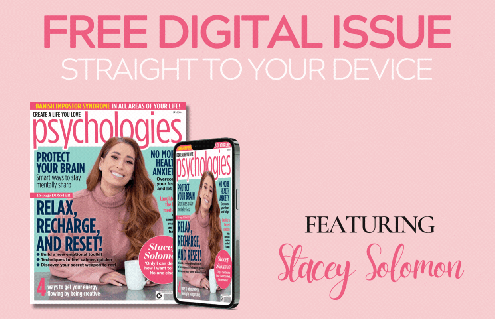Five steps to total wellbeing
Do you want to protect your health and boost your wellbeing? Dr Mark Atkinson, an integrated medical practitioner, shares his five best holistic health tips. By Rebecca Smith

1. Nurture your body
While we may have good intentions of taking care of our bodies with the right nutrition and exercise, many of us find it hard to keep this up. ‘We are often out of tune with our physical selves,’ says Dr Mark Atkinson, an integrated doctor who combines nutritional, psychological and complementary treatment with a conventional medical approach. ‘Our bodies constantly give us little messages but we don’t have the awareness to listen to them. However, our genetic code has hardly changed at all in the past 40,000 years. What this code demands is that we live a relatively simple life in which we nourish ourselves with fresh food, are physically active and live in the community. This is a far cry from the way most of us live today.’
His advice is to keep things simple and get the basics right. Good health is built on the foundations of adequate sleep and rest, a nutrient-rich diet, physical activity and spending a little time outside each day. Of these, Atkinson says the two biggest challenges facing women are getting enough sleep and rest. ‘Rest is a foreign concept to many,’ he says. ‘It is simply not doing, a passive state of open receptivity in, ideally, an environment of low or no stimulation, which triggers the relaxation response in the body. Many women are experts at doing, and not so good at just being. I recommend committing 15 minutes a day to rest, whether this is taking a walk or staring out of a window. We’re more likely to want to eat well, exercise and take better care of ourselves.’
2. De-stress and relax
From headaches and fatigue, to clenched jaws and backache, the symptoms of stress overload are familiar to many of us. ‘Most of my female patients are stressed,’ says Atkinson, ‘whether they are able to acknowledge it or not.’ While the challenges of everyday life are often enough to trigger stress — whether it’s relationship worries or juggling childcare and managing a career — he believes the main cause is the pressure we put on ourselves. ‘So many women give themselves a hard time,' he says. 'They may have a perfectionist streak, a desire to please others, to be “nice” all the time or just push themselves too hard.’
Stress can take its toll physically — causing muscular aches and pains, compromising our immune systems and reducing nutrient absorption — so how can we manage it better? ‘I recommend doing a stress inventory,' says Atkinson.' It helps you acknowledge you are stressed and regain control. Write down everything you are stressed about, big and small. Next to these things write down an action that can be taken to change the situation, or an acceptance that it may be out of your control.’ By doing this, you will start to understand your stress triggers. For on-the-spot stress relief Atkinson suggests the 4/7 breathing technique. When you feel tense or overwhelmed, take a breath in to the count of four then breathe out to the count of seven. Repeat this five times.
3. Accept yourself
In a culture preoccupied with self-improvement — our TV schedules are full of makeover programmes on cosmetic surgery or weight loss, all largely directed towards women — many of us feel we are not good enough. ‘The quickest way to peace of mind, and reaching our fullest potential, is learning to accept who and what we are,’ says Atkinson. ‘People who have a high level of self-acceptance feel healthier and happier and are less likely to develop depression or mental health problems.’
A good starting point is dealing with our inner critical voice. ‘Every time you hear this berating voice, get a sense of where it is,’ says Atkinson. ‘It’s often felt around the throat or chest, or in the head. Having located it, silently say to that part of yourself, “I see you and I accept you”, breathing deeply.’ By doing this every time you hear the critical voice you will, over time, disengage with it and reduce its power.
4. Face and embrace your emotions
‘One of the most common causes of ill health is a lack of emotional awareness,’ says Atkinson. ‘We often don’t know how to manage and process our emotions and spend time avoiding or sedating them with cigarettes, alcohol or caffeine.’ By working with our emotions and not against them, we can decrease the likelihood of emotionally induced illness, such as chronic pain or irritable bowel syndrome.
‘I work on the underlying premise that emotions are information,’ says Atkinson. ‘We need to welcome them without controlling or sedating them, and to avoid labelling them as good or bad.’
To get in touch with our emotions and understand how they can affect our physical health, Atkinson suggests asking ourselves what is undermining our self-belief. ‘Share your feelings with a friend so that you can process and digest the emotion to prevent it becoming a barrier to good health.’
5. Deepen and develop your relationships
The quality of our relationships can have a profound influence on our health, says Atkinson, and even affects our chances of getting sick. The Journal Of Chronic Diseases reports that people who feel isolated are three to five times more likely to become ill than those who don’t. For women, in particular, our sense of worth tends to be bound up in our circle of close relationships.
‘We are social creatures and genetically programmed to be in relationships,’ says Atkinson. ‘We all have a need to receive love, affirmation and validation, so creating life-enhancing relationships is crucial for our health and our ability to heal. It’s about quality relationships, not quantity. This means being emotionally intimate and involves a reciprocal openness and letting down of defences.’
This doesn’t stop with our partners and families. Having a good support network of friends is a critical component of mental health, says Atkinson. ‘Nurturing our closest relationships, and prioritising time spent with the important people in our lives, can be a direct route to better health.’ Dr Mark Atkinson is the author of 'Holistic Health Secrets For Women' and founder of The Academy Of Human Potential








